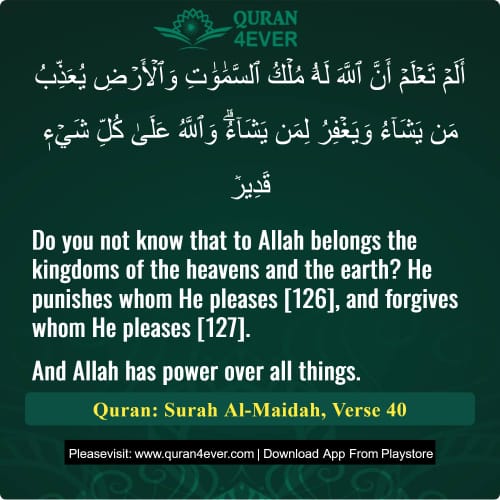
Transliteration:( Alam ta'lam annal laaha lahoo mulkus samaawaati wal ardi yu'az zibu many-yashaa'u wa yaghfiru limany-yashaaa'; wallaahu 'alaa kulli shai'in Qadeer )
Do you not know that to Allah belongs the kingdoms of the heavens and the earth? He punishes whom He pleases [126], and forgives whom He pleases [127]. And Allah has power over all things.
Allah is the ultimate Sovereign of the entire universe—all the kingdoms of the heavens and the earth belong to Him.
This verse reminds the believer of Allah’s absolute power and control over all creation.
Punishment is His prerogative: He punishes whom He wills according to His wisdom and justice.
The note clarifies that if the thief sincerely repents, he may be saved from the punishment of the Hereafter through Allah’s forgiveness, though the worldly penalty might still apply.
Allah also forgives whom He wills, demonstrating His mercy and compassion.
The phrase “Allah has power over all things” emphasizes that His actions—whether punishment or forgiveness—are exercised with complete wisdom and control.
There is no contradiction here: Allah does not punish without cause; His justice is perfect, and His mercy is vast.
The tafsir of Surah Maidah verse 40 by Ibn Kathir is unavailable here.
Please refer to Surah Maidah ayat 38 which provides the complete commentary from verse 38 through 40.
(5:40) Do you not know that to Allah belongs the dominion of the heavens and the earth? He chastises whom He wills and forgives whom He wills. Allah is All-Powerful.
There is no commentary by Abul Maududi available for this verse.

For a faster and smoother experience,
install our mobile app now.
Related Ayat(Verses)/Topics